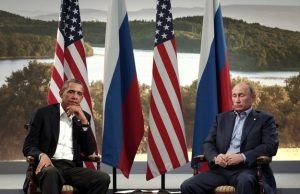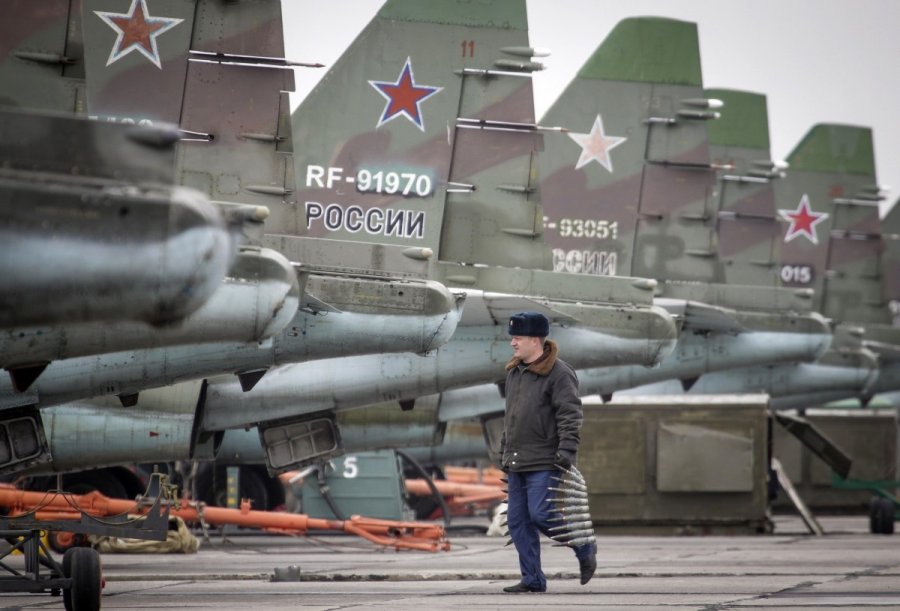
By: Kush Patel
Donning his blue and red dotted tie and iconic smile, President Reagan, alongside counterpart Soviet General-Secretary Gorbachev, signed a comprehensive treaty in the East Room of the White House. Both had accomplished a goal unimaginable 20 years before; they bilaterally agreed to end the proliferation and deployment of intermediate-range nuclear and conventional ground-launched ballistic and cruise missiles. What was hailed as a major arms control initiative by both leaders was also viewed as the beginning of the end of the Cold War. The over-arching threat of U.S. missile attacks from NATO-allied states on the Soviet Union and vice-versa were cautiously and diplomatically eliminated. The Intermediate-Range Nuclear Forces Treaty (INF) ushered in an age of mutual defense assurances between both superpowers.
Unfortunately, good things never last. Earlier last week, the United States revealed intelligence of Russia’s violation of the INF Treaty to its NATO allies. Russia allegedly began testing its intermediate capacity beginning in 2008. Assistant Secretary of State for Arms Control Rose Gottemoeller brought up the issue with Russian officials last May and was told that an investigation over the alleged violations was closed.
Having received intelligence of the violations in 2012, then Foreign-Relations Committee Chairman Sen. John Kerry stressed that the tests might endanger future arms control efforts. Now as Secretary of State, he has still of yet to raise those concerns with his fellow Russian counterpart, Foreign Minister Sergey B. Lavrov. Despite pressure from Capitol Hill, the Obama Administration has not yet formally declared the missile tests as violations. Yet, given the upcoming round of nuclear arms budgeting, the last thing the administration needs is a legislative defeat from yet another Russian tribulation.
The upcoming debate on cuts in nuclear weapons deployment systems comes at a critical time when the United States is evaluating every potential avenue of financial savings. Already in 2010, with the Strategic Arms Reduction Treaty (New START), the United States alongside Russia pledged to reduce its deployment capacities to 800 warheads, roughly a third of their respective stockpiles. However, President Obama, steadfast in his ultimate goal of a world without nuclear weapons, is not fully ready to settle with New START.
These further reductions pits the Obama Administration in a tough match of chess with Republican members of Congress. If the administration declares the missile tests to the public, anxiety against cutting nuclear arms would increase, but remaining silent would allow more chances for future arms-reductions deals with Russia while Obama is still in office. The treaty violation brings to light another dilemma: how does nuclear-armed America force nuclear-armed Russia to comply with a nuclear treaty?
Putin’s understanding of the situation remains all but clear. Having stated in 2007 that the INF Treaty no longer served the Kremlin’s interests, Putin also faces growing concerns for Russian security. Russia currently faces a growing missile proliferation threat from its own borders. China, set to eclipse the global weapons delivery systems market, remains to be Russia’s greatest geo-strategic foe and is free from bilateral nuclear arms control agreements with the United States. Ongoing Intercontinental Ballistic Missile (ICBM) tests by the Chinese situates Putin’s Russia in a strategic bind: should it pursue an arms control course with the United States or counter a growing Chinese military posture.
Back in Washington, lawmakers are asking themselves if the course of further arms control agreements yield tangible benefits. Former Sen. John Kyl (R-Ariz.), a well versed GOP leader on missile defense, commented that the Russian violations were a major part of his opposition to New START. Sen. Lindsey Graham (R- S.C.) pointed out that the violations were instances of Putin testing the US’ boundaries. Republicans in the Senate proposed an amendment to the National Defense Authorization Act (NDAA) that would force the administration to provide Congress reports on its intelligence sharing with NATO countries on compliance issues related to the INF Treaty. Though the amendment never gained full support, GOP lawmakers continue to press the administration to consult Russian authorities and formally declare the treaty violations.
This area of uncertainty leaves the Obama Administration with relatively few options, especially when the president’s foreign policy legacy lies in the balance. The decision will dictate the culture of future arms control enforcement. The INF Treaty violations show more than just a failure to meet 27-year treaty standards; they demonstrate a significant threat to the concept of arms control compliance, especially with the United States. Though no country remains totally immune to the ever-present security dilemma, the sullied basis of these international agreements can entice other states to further proliferate their weapons delivery systems. Recently, the United States and Russia (along with the United Nations Permanent Security Council Members, plus Germany) have come together in multilateral agreements with other nations to enact arms control agreements, but what does message does the diplomatic convoy send when one of its most powerful members cannot abide by a longstanding accord?
Mindful of the steady military modernization by other states, if the Obama Administration is to act, it must be wary of all potential flawed outcomes propagated by future arms control agreements.

